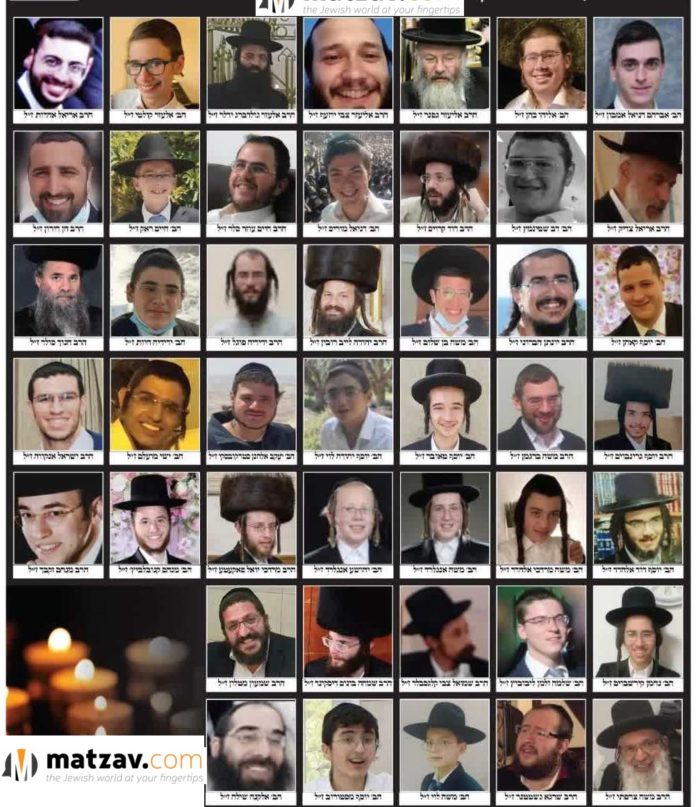Take a look at their faces. Do they look particularly dismissive of Torah study or modesty? * The real stampede is overbearing rebuke, fixation on negative attention.
By Rabbi Boruch Merkur

It’s one thing to be rebuked for your shortcomings. It’s another to be rebuked for what you’re already scrupulous in.
When “one of the most senior leaders of the ultra-Orthodox world” was asked what needs to be rectified in the wake of this year’s Lag B’Omer disaster, he replied:
“We must strengthen ourselves in Torah … and women should strengthen themselves in modesty.”[1]
HaAretz posted pictures and names of the 45 lives taken on that day, saying of them:
Among the 45 victims of the stampede at Israel’s Mount Meron … were 13 minors, including two pairs of brothers. All were men or boys, and many of the men had multiple children.[2]
Take a look at their faces. Do they look particularly dismissive of Torah study or modesty? Look what they died for celebrating – the life and passing of the pure and holy sage, Rabbi Shimon bar Yochai. And look how they celebrated - for the sake of modesty, there were only men in the crush.
It is difficult to swallow that the very things they died trying to preserve are the areas that most need rectifying. That’s the message we are to take from this tragedy?!
G-d guides us in our lives through the principle of precise measure-for-measure compensation (mida k’neged mida).[3] If G-d were not so exact, it would appear that we live in an arbitrary world of chaos. How would we know what area to work on to rectify our shortcomings?
To blame this tragedy on neglecting Torah study, especially those who had already put scholarship on a pedestal, is harsh and arguably abusive. But for a Jewish leader to point the finger at women, righteous women who already excel in modesty, and insist that they take tznius to the next level, risks further distancing themselves from those they seek to guide.
*
It is harmful to give hem length too much negative attention. Consider this commentary on the verse, “When Avrom came to Egypt, the Egyptians saw how very beautiful the woman was”[4]:
The phrase, “When Avrom came to Egypt,” means that to some extent, Avrom, by hiding Sarai in a chest when crossing the border into Egypt, directed the attention of the Egyptians towards her beauty. For when it was opened, all the Land of Egypt was dazzled by her splendor, as our Sages teach.[5]
By concealing Sarai in this unusual way, Avrom increased the wonder of this powerfully compelling fascination [her incredible beauty],[6] beyond what would have been had they come to the city as a couple, like anybody else. Had Avrom expressed his concern for modesty in a regular way, nobody would have stared at her to such a degree, with inappropriate desire to behold her beauty, immediately upon their arrival.
In fact, by concealed his wife, Avrom departed slightly from his perfect faith in G-d, his L-rd. Had he maintained his perfect faith in G-d - as he had always done in other lands - and they arrived in Egypt openly seen by all, then it would have been more publicly apparent that she was not looked at inappropriately. They would, therefore, not have been able to touch her at all [to bring her to Pharaoh]. Seeing her would have even uprooted from them their lustful desires for her …
All this was caused by the coarseness of the Land of Egypt. Their impurity was so pronounced that even Avrohom Avinu, the world’s greatest tzaddik, fell a little, departing slightly from his illustrious spiritual height.[7]
*
Fixating on the modesty of others will dissipate when we shake off our fears of engaging and confronting the world. The world is no longer an impediment to geula, in every respect. The Rebbe’s Chassidim have confidence that we have completed avodas ha’birurim, as the Rebbe has said.
Our focus now is on bringing the spirit of redemption into everything, ushering in a new world, where “nothing will remain concealed, as it says,[8] ‘Your Guide will no longer be concealed, but your eyes will watch your Guide’”[9]:
The entire world will be G-d’s home, dira l’Atzmuso, as a person lives in his home, where his whole character is openly revealed. In fact, this overt awareness of G-d reaches the point that He appears (in special times) without any garment. (FN 48: “Not even a garment necessary to cover oneself with, etc., so that one’s heart should not ‘see,’ etc. [below the belt].”[10])
This state of unhindered revelation will find expression in the Future Era, as it is written, “Your Guide will no longer be concealed,” meaning “He will not conceal Himself from you with hem or garment,” rather there will be “the light of G-d that is revealed in the Future, without any garment.”[11]
*
NOTES:
[2] https://www.haaretz.com/israel-news/these-are-the-45-victims-of-the-mount-meron-disaster-1.9763322
[3] Sota 11a (also, see Rashi on Yisro 18:11):
Rebbi Elazar says: What is the meaning of the verse, “Now I know that the Lord is greater than all gods, for in that which they conspired (zadu) against them”? It means: In the pot in which they cooked, they themselves were cooked, as they were punished through drowning, measure for measure, for drowning Jewish babies. From where may it be inferred that this word “zadu” is a term meaning “a pot”? The Gemara answers: As it is written: “va’yazed Yaakov nazid - And Yaakov simmered a pot.”
[4] Lech Lecha 12:14
[5] B’Reishis Rabba 39:8
[6] הוא נתן קצת אצבע בין שיניהם להביט ביופיה
[7] Be’er Mayim Chayim on Lech Lecha 12:14
[8] Yeshaya 30:20
[9] Seifer HaSichos 5751, pg. 586
[10]תני רב יוסף שארה זו קרוב בשר שלא ינהג בה מנהג פרסיים שמשמשין מטותיהן בלבושיהן מסייע ליה לרב הונא דאמר רב הונא האומר אי אפשי אלא אני בבגדי והיא בבגדה יוציא ונותן כתובה - כתובות מח,א
[11] [11] Seifer HaSichos 5751, pg. 587